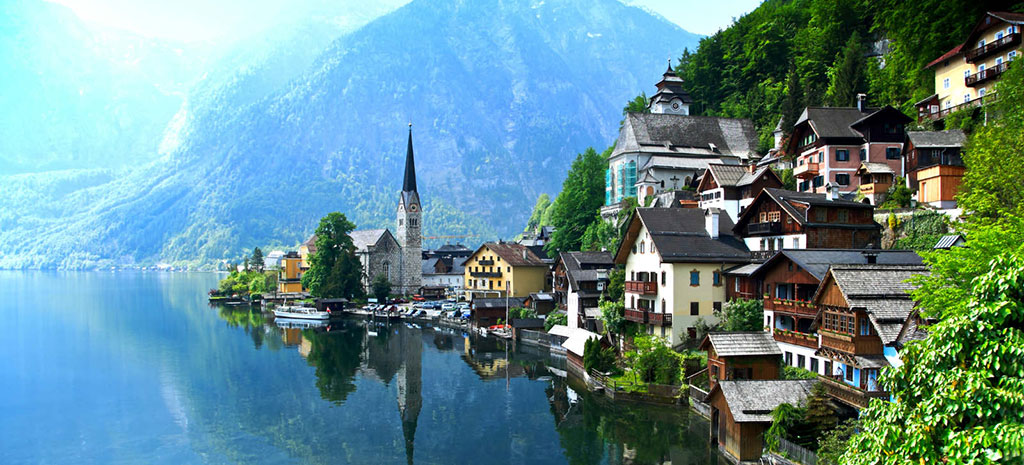
Study in Austria
Last edited on 04 Mar 2026
Hi! Welcome to Austria!
Hallo! Willkommen in Österreich!
Located in Central Europe, Austria is home to over 8 million people and shares its borders with Germany and the Czech Republic to the North, Slovakia and Hungary to the East, Slovenia and Italy to the South, and Switzerland and Liechtenstein to the West. It may be relatively small, but there are many reasons to study in Austria, including a number of universities which rank among the world's best. In terms of area, Austria is half the size of Sulawesi, and in terms of population, it is home to roughly the same number of people as Jakarta. But this beautiful Central European country, full of stunning landscapes and exuberant cities, should certainly not be judged on size.
A naturally beautiful country, it is known for its pastoral landscapes, stunning mountain vistas and timeless cities steeped in history and culture. Austria combines a long tradition of higher education with state-of-the-art research – its higher education institutions have accomplished outstanding achievements on an international level and gained a high reputation.
Austria’s past as a European power and its cultural environment has spawned world class artists in various art forms but most notably in music, with composers such as Mozart and Strauss whose works continue to inspire. Austria has also been the birthplace of many famous scientists and Nobel Prize winners. In fact, as of late 2012, 19 Austrians had been awarded Nobel Prizes, including seven in Physiology or Medicine, four in Chemistry and three in Physics and the country has one of the highest number of Nobel laureates per capita in the world. Austria’s capital city Vienna, also described as Europe’s cultural capital, ranks as one of the most attractive cities in the world and has been ranked as the top city in Mercer’s Quality of Living survey in 2016. This metropolitan city has a charm, vibrancy and flair that is unique and found nowhere else. The official language of Austria is German.
Higher Education System
There are a wide variety of higher educational institutions in Austria. A total of 22 Austrian universities offer a broad range of study options for students. Some 500 different study options are available in Austrian Higher Educational Institutions. About one fifth of the students at Austrian universities come from abroad. The following academic degrees can be obtained in Austria; University level first stage (Bachelor’s degree): Bakkalaureus, Bakkalaureus (FH); University level second stage (Master’s degree): Magister, Magister (FH), Diplom-Ingenieur, Diplom-Ingenieur (FH); University level third stage (PhD): Doktoratstudien. The Austrian education system is of a high standard and five Austrian universities recently featured in the Global Top 400 of the Times Higher Education World University Rankings 2015-2016 – the highest of which is The University of Vienna ranked overall 142 in the World.
Universities in Austria
Student Cities in Austria
Vienna
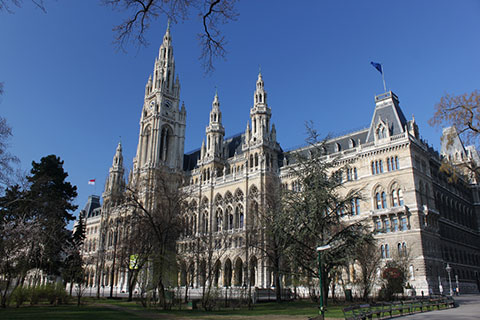
Austria’s capital and largest city by far, Vienna boasts one of the world’s highest standards of living, a large and diverse student population, and an incredibly rich cultural landscape. This combines with its strong universities and relatively low tuition fees to earn it a place among the world’s top 20 cities for students in the QS Best Student Cities index. Famed for its beauty, Vienna has preserved an impressive amount of green space, as well as boasting attractive baroque architecture, magnificent palaces, some of the world’s most celebrated museums, and a renowned café culture.
The city has a particularly impressive musical and artistic pedigree (having been home to Brahms, Beethoven, Mozart, Fuchs, Klimt and Loos, among others), and has a number of prestigious academies dedicated to fine art and music. It’s also home to two of the highest-ranked universities in Austria: the University of Vienna and Vienna University of Technology, ranked 155th and joint 183rd in the world respectively.
Innsbruck
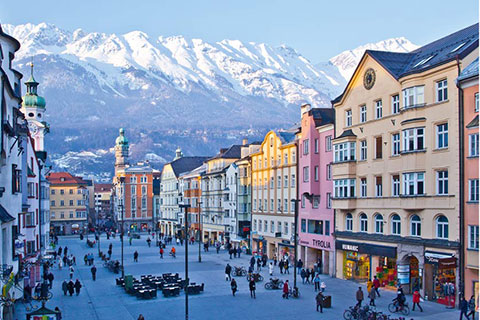
Twice host to the Winter Olympics, alpine city Innsbruck is a paradise for those with a passion for mountains. The Austrian Alps are pretty much always in sight here, and you can be making your way to the top in a cable car in less than half an hour. Even if you’re not a keen skier or snowboarder, Innsbruck is simply a beautiful place to be; its combination of attractive traditional and modern architecture, against the mountain backdrop, is difficult to beat.
Innsbruck is also known as a student-centered town; it’s home to Austria’s third largest student population, and has a lively nightlife ranging from traditional beer gardens to trendy bars. There are several universities here, of which the most prominent is the Universität Innsbruck, ranked within the world’s top 300.
Graz
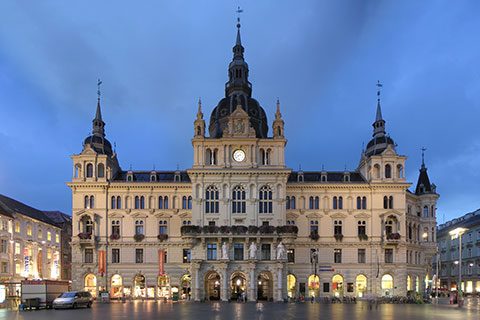
Austria’s second largest city, Graz has a reputation for being a student town, with those enrolled at its four universities constituting a major chunk of its population. The best-known of its institutions is Karl-Franzens-Universität Graz (also called the University of Graz), which ranks within the world’s top 500 in the QS World University Rankings 2016-2017. Unsurprisingly given its major student community, Graz offers a vibrant nightlife, alongside a famously relaxed attitude. Located in the heart of the state of Styria in the southeast of the country, Graz is also renowned for its food, offered called the “culinary capital” of Austria.
Linz
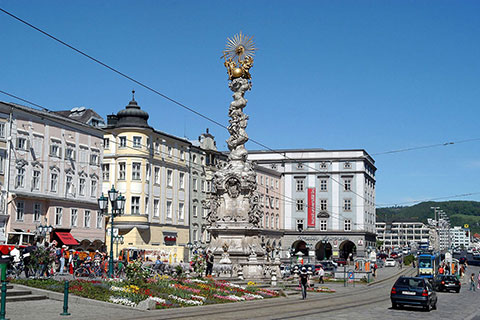
Departing from the historic architecture and traditional feel which characterizes many popular Austrian cities, Linz is known for its much more modern urban aesthetic. Austria’s third largest city, it was European Capital of Culture in 2009, having transformed its central area into a sleek, gleaming space full of modernist architecture and contemporary public artworks. The city’s old town remains lively and full of character, with plenty of cafés and bars to check out, while major cultural venues include the Brucknerhaus (a festival and concert center named for the region’s famous composer, Anton Bruckner) and the Lentos Art Museum, one of the nation’s leading venues for modern art.
Universities in Linz are led by Johannes Kepler University Linz, which ranks among the world's top 600 in the QS World University Rankings 2016-2017.
Salzburg
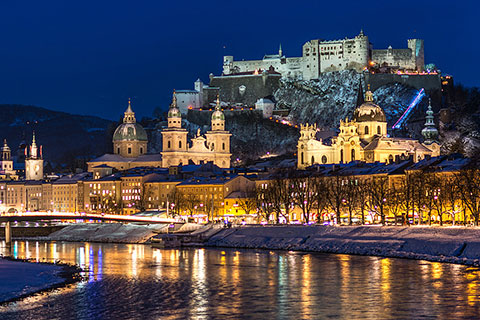
Another of Austria’s most popular tourist destinations, Salzburg is a well-preserved historical city. While Salzburg’s ‘old town’ neighborhood has World Heritage Site status, it’s also presided over by the imposing Festung Hohensalzburg, a 16th century fortress (construction actually started in the 11th century) that sits on a mountain overlooking the town. But Salzburg is no time capsule; with plenty of bars, cultural institutions and winter sports, there’s no shortage of things to do once you’ve completed the tourist trail.
Universities in Salzburg include the Paris Lodron Universitat Salzburg (also known as the University of Salzburg), which is ranked in the 701+ range of the QS World University Rankings 2016-2017.
Application, Fees and Visas in Austria
Applying to study in Austria
In order to study in Austria, you should apply directly to the Austrian university at which you wish to enroll. Your secondary qualifications must be considered to be of an equivalent level to those offered in Austria, and must be sufficient to gain entry to a similar program in the country where it was earned. You will also need to prove that you speak German or English to the level stipulated by the university, depending on the language in which your program will be taught.
At undergraduate (bachelor’s) level, the majority of courses in Austria are taught in German, with a larger selection of English-taught programs available at master’s level. If you are applying to a Universität der Künste (university of the arts), you will be asked to sit an entrance examination.
You might find all the information on Austrian universities and study options here.
Visas to study in Austria
Information brochure of the Austrian entry and residence requirements for foreign students wishing to study in Austria: http://www.bmi.gv.at/cms/BMI_Niederlassung/allg_infos_neu/guide_entry_students.pdf
Students coming from countries which are not EU/EEA members need to apply for a Visa Type D if they want to stay less than 6 months or for a residence permit if their intended stay exceeds 6 months.
As a matter of principle, first applications for a residence title or visa shall be filed abroad and in person at the Austrian Embassy, before entering Austria. Once having submitted the application for your Residence Permit, the general processing period is three up to six months until you will get a decision from the Austrian authority. Do take that into consideration in your planning!
You can find detailed information about studying and doing research in Austria and for applying for a Visa or a Residence Permit on the website of the Austrian Agency for International Mobility and Cooperation in Education, Science and Research (OeAD) under the following link.
The website and the guides provide checklists for the application for Visa or Residence Permits; you can also find all necessary links to application forms, explanation of the application forms in English and contact details of universities and Austrian authorities.
www.migration.gv.at provides additional information.
In case of further questions, contact the Austrian Embassy.
Fees and funding
If you come from a non-European Union country such as Indonesia, the tuition fees amount to only €726.72 (~US$780) per semester. The student union membership fee is €17.50 (~US$19) per semester, and is compulsory for all students. Some scholarships might be also available for international students – for example through LPDP for master studies. For PhD students a variety of scholarships are available (find more info here: http://grants.at/).
Fast fact
- Federal republic, split into nine states
- Parliamentary democracy, headed by president and chancellor, with bicameral legislature
- Landlocked country in central Europe, with a population of around 8.6 million and a total area of 83,879 square kilometers
- Borders with Germany, the Czech Republic, Hungary, Switzerland, Italy, Slovakia, Slovenia and Lichtenstein
- International dialing code: +43
- Central European Time (UTC+1)
- Member state of the EU, but not a member of NATO (the only continental EU country that is not a member of NATO)
- Austrian males must serve for six months in the military or nine months on civilian service when they reach 18.
- Official language: German
- Currency: Euro (€)
- Main religion is Roman Catholic, but as well big groups of Muslims and Protestants
- Capital: Vienna (also by far the largest city)
- 62% of Austria's total land area is covered by the Austrian Alps.
- The Austrian flag is one of the oldest national flags in the world, dating from 1191.
- The oldest zoo in the world is the Tiergarten Schönbrunn in Vienna, founded in 1752.
Wish to enjoy your time in the heart of Europe? Austria is the right decision to land. Austria offers you great social security, economic stability and the warmest welcome from the Austrians. When it comes to educational opportunity, for sure Austria offers you a broad spectrum as it combines a long tradition of higher education with state-of-the-art research.
Wide range of degree program you could choose to experience includes: research-based courses at research universities, a world-famous education at any of the universities of the arts, high quality of practice-oriented courses at the universities of applied sciences, and innovative courses at private universities. Before you made your choice, here are the scholarships available to make your study plan comes true:
Ernst Mach Grant (EMG)
Focus Scholarship: Master, PhD, Post Doctoral
Competition: worldwide
Scholarship Coverage: Partial Scholarship
The Ernst Mach Grant program is named after the famous Austrian physicist and philosopher Ernst Mach (1838-1916). The grant program is financed by the Austrian Federal Ministry of Science, Research and Economy (BMWFW). The scholarship offers funding support in the duration of 1 - 9 Months for Postgraduates, PhD holders, and Post docs. It is awarded in the form of monthly expenses of € 940 for Graduates and PhD Degree € 1.040. Accident and health insurance would be also provided. Travel expense of maximum € 730 is refundable. In addition, recipients of grants are exempted from paying tuition fees.
Criteria
- Applicants must not have studied/pursued research/pursued academic work in Austria in the last six months before taking up the grant.
- Maximum age: 35 years
- For projects to be carried out in English a good knowledge of English in the respective subject area is required: Natural Sciences, Technical Sciences, Human Medicine, Health Sciences, Agricultural Sciences, Social Sciences, Humanities, Arts
Special OeAD Scholarships
Focus Scholarship: Master, PhD, Post Doctoral
Competition: worldwide
Scholarship Coverage: Partial Scholarship
OeAD stand for Austrian agency for international mobility and cooperation in education, science and research. The agency manages various scholarship programs and provides financial support both for individuals and for scientific projects. It is a great opportunity for Undergraduates, Graduates, Postgraduates, Doctoral Students and Researchers to finance their degree. Please note that the OeAD is not applicable for obtaining a whole bachelor’s degree, master’s degree or completion of a PhD program in Austria.
Ernst Mach-Grants – ASEA-UNINET
Focus Scholarship: Research grant for PhD holder and Post-Doctoral
Competition: Designated countries: Indonesia, Philippines, Thailand, and Viet Nam
Scholarship Coverage: Partial Scholarship
Formerly known as Technology Grants South-East Asia, the program supports the knowledge-transfer between partner universities in European member countries and South-East. The scholarship offers Indonesia, Philippines, Thailand, and Viet Nam citizens funding support in the duration of maximum 36 months for Postgraduates; 1 - 9 Months for PhD holders and Post docs. It is awarded in the form of monthly expenses of € 940 for Graduates and PhD Degree € 1.040. Accident and health insurance would be also provided.
Criteria
- Graduates of artistic fields for a study visit in the field of music.
- Postgraduates who want to carry out a doctorate/PhD-program in Austria and fulfill the requirements for admission.
- Post docs who are involved in teaching and research at a university in Indonesia, Philippines, Thailand, or Vietnam.
- Study area: economic and social sciences, economic topics with a connection to technology or industry are preferred.
- Maximum age for graduates and postgraduates: 35 years and post docs: 45 years
- Online application required, find more information on the website page
Ernst Mach Follow-up Grant (EZA)
Focus Scholarship: Research grant for PhD holder and Post-Doctoral
Competition: Developing Country
Scholarship Coverage: Partial Scholarship
It is only available for specific country of origin; you could access the list on Ernst Mach Follow-up Grant page. Different from EMG, this scholarships only available for PhD holders and Post docs. Awardees could make use of the support between 1 – 3 months as a supplementary grant. Benefit of € 1040 monthly expenses would be covered.
Criteria
- Maximum age: 50 years
- Applicants must not have studied/pursued research/pursued academic work in Austria in the last six months.
- Required documents have to be uploaded together with the online application at www.scholarships.at







